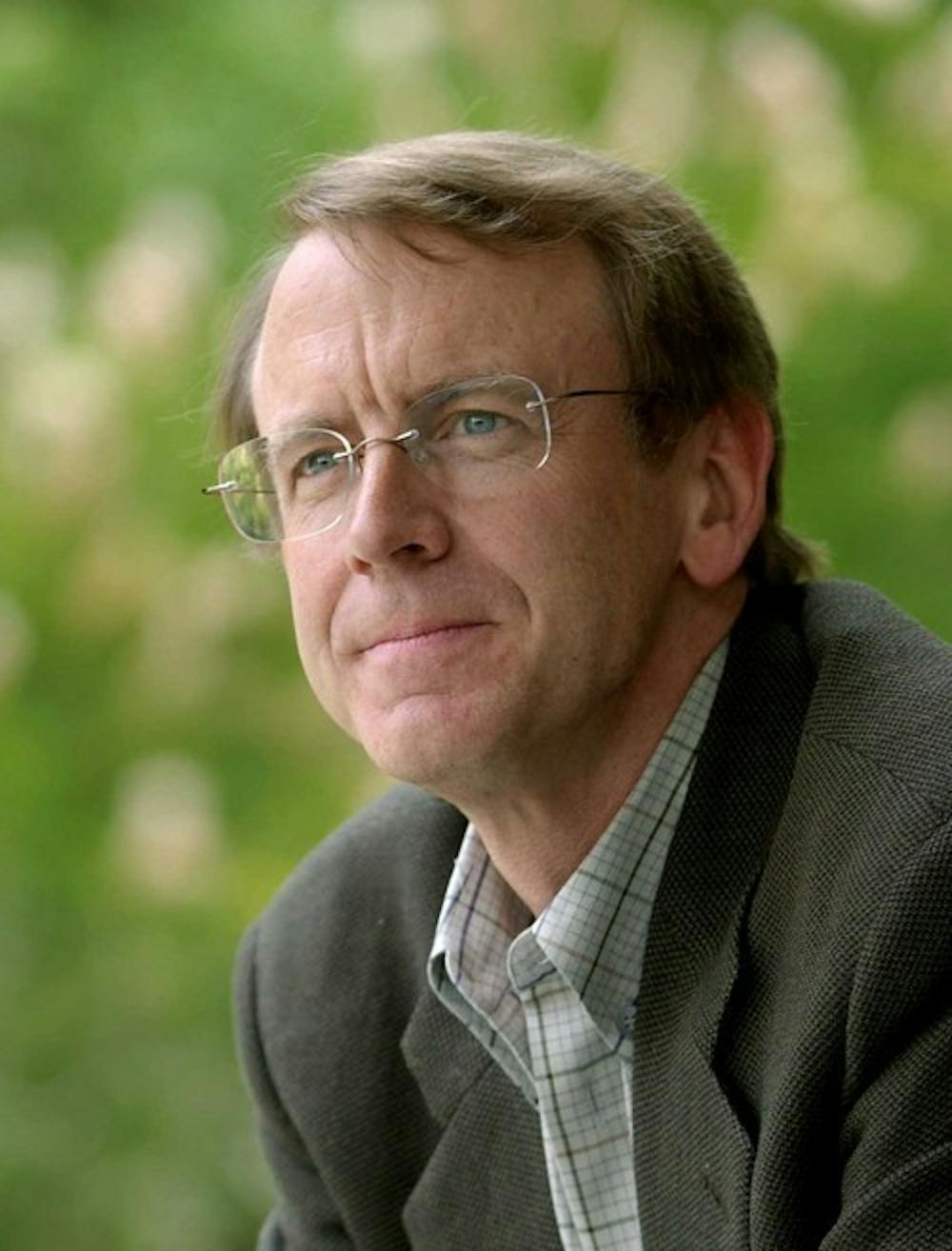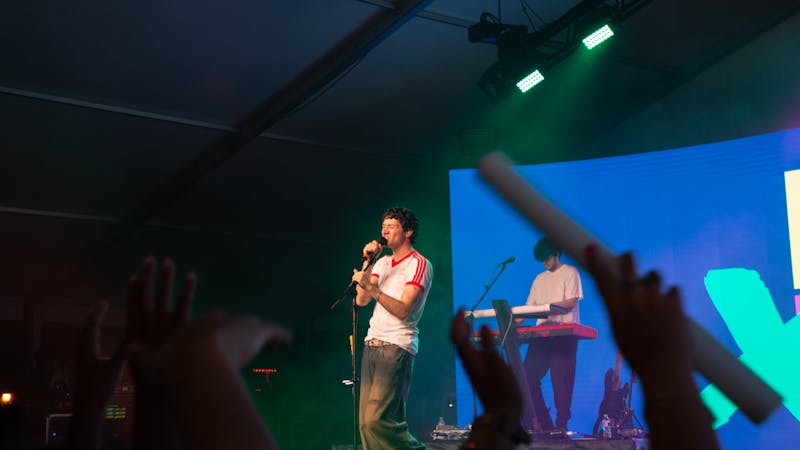Human Capital: $50 million gift a result of mutual desires

John Doerr from KPCB
General Tom Kolditz stood in front of a crowd of Rice University parents during Families Weekend in October and began describing the World War II surrender of a German command to General Charles Canham. In the story, the German general walks up to Canham and a group of ragtag infantrymen and asks to see his credentials. Canham then gestures to his soldiers and says, “These are my credentials.”
“That’s how I feel here at Rice,” Kolditz, director of Rice’s Doerr Institute for New Leaders, said to the audience, pointing to the seven Rice students on stage. “I’ll just tell ya, you’re going to have a great time this afternoon with my credentials.”
The students were participants in the Doerr Institute for New Leaders pilot program, which provided individualized leadership coaching to 12 hand-selected Rice students over the course of a month. It’s the first step in a larger rollout of the institute, which was endowed by the largest single gift ever made to Rice: A $50 million donation from venture capitalist John Doerr (Lovett ’73) and his philanthropist wife Ann (Jones ’75) through their charitable organization, the Benificus Foundation. The institute promises to make leadership development opportunities available for all Rice students.
"I’m an innovation junkie,” John Doerr, speaking for himself and Ann, said. “I worship at the altar of innovation. Big ideas, disruptive ideas: Those are the germ plasm, the seed corn of progress and prosperity.”
But Doerr also likes to say that ideas are plenty and execution is scarce, making good team leadership crucial.
Doerr’s beliefs square with Rice President David Leebron’s Vision for the Second Century: In 2006, the Board of Trustees revised the university’s mission statement to reflect the V2C, which calls for the production of “leaders across the spectrum of human endeavor.” In the years since, Rice has seen a boom in leadership with the creation of the Center for Civic Leadership, the Rice Center for Engineering Leadership and a number of other leadership initiatives. The Doerrs endowed RCEL with a $15 million gift in 2008.
According to Darrow Zeidenstein, vice president of Development and Alumni Relations, the donation for the institute was the culmination of years of discussion about leadership between the Doerrs, President David Leebron and the Office of Development and Alumni Relations beginning in 2007.
"John’s a very analytical and methodical guy, and he said, ‘Here are the five areas Ann and I care about,’” Zeidenstein said. "From his point of view, there are probably other places where he can influence [areas such as climate change]. But leadership: He clearly thought Rice could be great in moving that agenda along."
Not long after Leebron announced his V2C, Doerr gave the 2007 Rice commencement speech. As part of his preparation for the speech, he talked to two dozen Rice seniors about their values and curiosities. He said Rice students were clearly interested in figuring out what mattered in life, but many of them also weren’t prepared to be leaders despite their academic abilities.
"These were all very smart, very technically proficient people, but I’d say of the 24 there were only a couple of them that I think exhibited leader DNA,” Doerr said. “And I thought to myself, what if that was added to the incredible mix that Rice University is?"
Doerr defines leaders as people who dedicate themselves to a team, listen to others, are self-aware, attract followers and work well in nonhierarchical groups. Kolditz calls this a service-oriented leader, Doerr said, and points to the types of people Google and Facebook want to hire. Leebron said he often cites Ann Doerr’s belief that every interaction is an opportunity for leadership and that everybody has the potential to be a leader.
Above all, Leebron said he sees the gift as an investment in students supporting a central aspiration of the revised mission statement: “Contributions to the betterment of the world.”
The Program
Wiess College senior Isabel Scher was one of the seven students onstage with Kolditz during Families Weekend. Her freshman year, she attended the Impact Rice Retreat. She was then selected for a Student Mentorship Experience where she was taught how to be a “star follower” at an internship. She has participated in many of the well-known entrepreneurship and leadership programs Rice offers, including Rice Launch, OwlSpark, Alternative Spring Break, the Initiative for Students, a Center for Civic Leadership capstone and finally, the Doerr Institute for New Leaders pilot program.
Zeidenstein nominated her for the pilot program when she was interning with the Office of Development and Alumni Relations. She was assigned a coach, who helped her manage her long-term goals and short-term commitments.
“It’s kind of like having a therapist, but instead they’re your coach," Scher said.
Another student in the program, Wiess College senior and Coffeehouse general manager Mason Daumas, worked on communicating in group settings.
Leadership coaches are licensed professionals, often with graduate experience in psychology, who discuss leadership with their clients and encourage self-reflection. On average, students in the pilot program met with their coaches for 3.5 hours over the course of the month, according to Kolditz.
Kolditz said the institute believes in the 70-20-10 system of leadership education: 70 percent experience, 20 percent reflection and 10 percent classroom learning. He said he hopes to hire a few full-time coaches who work with a larger pool on an as-needed basis. The cost of coaching 500 students is the same as the yearly salary of a top Rice professor or senior administrator, resulting in a high return on investment, according to Kolditz.
"Our basic design principle is to take the experiences that students already have and use those experiences to develop students by adding this reflective component through coaching and other processes,” Kolditz said. “And that’s a proven way. There’s no controversy about whether that works — it does. It’s just a matter of how we fit that to the Rice circumstances and culture."
Unlike mentors, leadership coaches do not necessarily have more subject matter knowledge than their mentees, according to Kolditz. Wiess College sophomore Marley Foster said she is unsure how helpful leadership coaches will be in different leadership contexts — she is an editor at R2: The Rice Review.
“Being that broad, you’re not going to be able to really help people, because at a certain point you need mentors who are more specialized,” Foster said. “In an effort to be so general, you’re missing the higher-level stuff that’s going to need much more specific people.”
Rice English professor Judith Roof said she was also skeptical about the administration’s attitude toward faculty and their mentorship abilities.
“Do they think perhaps the experts in the field don’t have the capacity to teach and help students in all of these endeavors without putting a name on it?” Roof said. “... We need to bring in ringers to teach leadership because clearly the faculty don’t know how to do that — why do they think that? And why do they think they can detach people skills from context?”
After going through the pilot, Scher said she has two main concerns about the program: the lack of a social component, such as group work, and the difficulties associated with standardizing the coaching.
Scher said some common themes emerged over the month that could have been more efficiently addressed in a group or precoaching class. She noted that multiple students said their coaches helped them with stress management, breathing techniques and issues related to team dynamics.
Kolditz plans to announce a larger pilot program for 350 students in the spring. He will then incorporate feedback from the second pilot into the full launch of the coaching program in the fall. According to Kolditz, freshmen will be required to do a standardized preparation program before they can be coached as sophomores.
On top of coaching, Kolditz said eight to 12 other initiatives are in the works, including the already-underway Leader Development Council meetings, a metrics team called Third Eye, a web-based Leader Development Navigator and a professional leadership coaching certification program. Kolditz hopes to reach as many students as possible through the institute, but he also acknowledged at a Leader Development Council meeting that he never estimates that more than 60 percent of students will voluntarily engage in such programs.
For Scher, the institute offers a different vision of leadership than any other offered on campus.
"The same people get the same things,” Scher said. “You get ASB, you get Impact, you get Leadership Rice. There’s a certain very public program that [campus] leaders go for, and [the Doerr Institute] is saying you don’t need to be in a leadership position to get trained to be an effective leader when you leave Rice."
The Donors
John and Ann Doerr met when a Rice computer science professor introduced the two as undergraduates. They both completed bachelors and masters degrees in electrical engineering at Rice. John Doerr also remembers the 1970s as a time of entrepreneurial activity — he signed KTRU’s application for an FM license and worked as a DJ and program director.
Now, John Doerr is one of the most well-known venture capitalists in the world as a partner at Kleiner Perkins Caufield & Byers, an early investor in Google, Amazon and Netscape, among other companies. Forbes calculates his net worth as $4.5 billion, making him the 135th-wealthiest person in America. Ann Doerr serves on the board of trustees of the Environmental Defense Fund and is chairman of the Khan Academy.
The Doerrs have signed the Giving Pledge, meaning they plan to give more than half of their wealth to philanthropy. They primarily focus their donations on climate change, education, poverty and women empowerment.
"Human potential is evenly distributed all around the world, so I’m hoping that the Rice program will be a role model, a pioneer, an innovator, a thought leader and something that’s widely copied," Doerr said.
Diversity, Doerr added, is critical for good leadership. He cited studies showing diverse groups make better decisions and execute better than homogenous ones.
"The Doerr Institute for New Leaders should be the Diverse Institute of Leaders, or the Institute of Diverse New Leaders,” Doerr said. “Diversity is really important."
Doerr emphasized that diversity does not just mean diversity in thought, but also in gender, race and other identities.
Doerr’s firm, KPCB, was implicated in a gender discrimination lawsuit brought by former employee Ellen Pao. During the trial in 2015, the prosecution played a tape in which Doerr, who was Pao’s mentor at the firm, told an investigator that Pao had a “female chip on her shoulder.” Pao also claimed that Doerr did not sufficiently address a list of equality concerns he asked female partners at the firm to compile.
At the same time, Doerr lamented the lack of women in venture capital during the trial, and many portrayed him as Pao’s biggest proponent at the firm. A jury eventually ruled with KPCB.
“I think, in many ways, women are more effective leaders than men," Doerr said.
The Leader
Following the donation, the next step for Leebron and Doerr was to find a leader for the leadership program.
After a more than year-long, worldwide search, Rice named Kolditz as the director. Kolditz previously implemented leadership development programs at Yale University and West Point after retiring as a brigadier general in the Army.
Kolditz said in his October Families Weekend speech that he interviewed 177 Rice students and community members in 10 weeks and found students usually cited peers and upperclassmen as their main sources of leadership development.
"What they’re most excited about is that we’re not planning any contrived events — no workshops, no retreats, ropes courses, none of that — because students tell us they’re very busy,” Kolditz said. “And so they would much prefer to be developed in the way we’re planning it."
The Impact Rice Retreat and the Leadership Summit for student organization leaders are both known for their camplike atmospheres. But Kolditz, who wrote a book about the applications of leadership in dangerous situations entitled “In Extremis Leadership: Leading As If Your Life Depended On It,” said neither he nor students are interested in contrived leadership experiences.
“We refer to that here in the institute as leadertainment," Kolditz said.
On diversity, Kolditz believes in an individualized approach.
"Because we’re coaching people one person one at a time, there’s no greater respect for diversity than that,” Kolditz said. “You start to lose when you start herding people into classrooms based on how they look or where they came from."
The Value Proposition
When Leebron speaks to alumni to promote the Initiative for Students, he brings charts. Two of them show the value proposition of college in 1985 and his projection for 2025. In 1985, 75 percent of college’s value for students comes from the classroom and 25 percent from outside. However, in 2025, those two numbers are flipped.
The Doerr Institute, Leebron said, is part of an effort by Rice to catch up to the demands of the modern student. The Student Association’s 2015 Rice Education of the Future initiative found that, after the classroom component at 25 percent, the next highest-valued aspect of the Rice experience by students was leadership at 16 percent.
In his speech introducing Kolditz during Families Weekend, Leebron noted that student demand for extracurricular experiences has contributed to the rising cost of higher education. While donations such as the Doerrs’ often go straight into the endowment, Leebron said some of the gift was spent immediately on growing the institute. Often, the results from donations take years to be realized, he said.
Sometimes, according to Leebron, large gifts even cost the university money, making them a cost-benefit decision.
“We’re expected to provide so much more than we used to provide to our students,” Leebron said in his speech.
Foster, however, said the university focuses on larger issues at the expense of small fixes.
“In an effort to start a bunch of new initiatives, they’re missing smaller things that there is a much higher demand for,” Foster said. “I don’t think anybody is sitting around going, ‘I wish we had a leadership institute,’ but I need $5,000 for a kiln. That is a very specific need that our art department needs to fill.”
For Roof, the university has failed to address core needs, like classroom space for the humanities.
“This place is all cosmetics and no substance,” Roof said.
According to Leebron, heated debate is all part of the development process at a university like Rice.
"I don’t get to do many things where there’s not some disagreement,” Leebron said. “I got to build the [recreation] center. That had no disagreement."
More from The Rice Thresher

Rice Students for Justice in Palestine declares ‘liberated zone’ on campus
As student protests erupt across the country, Rice Students for Justice in Palestine launched a “liberated zone” on Rice campus, announced a two-day series of events and started construction on an “apartheid wall.”

Jeremy Zucker headlines second-ever Moody X-Fest
Jeremy Zucker headlined Rice’s second annual Moody X-Fest in Founder’s Court on April 19. In advance of Zucker’s set, student groups like Basmati Beats, Rice Philharmonic and BASYK performed. The festival also offered complimentary merchandise and food from Dripped Birra, Cane’s and Oh my Gogi.

Jones wins men’s and women’s Beer Bike races, GSA snags alumni
Jones College won both the women’s and men’s Beer Bike 2024 races, while the Graduate Student Association claimed the alumni team win. Hanszen College bike teams were the runner-up in the alumni and men’s races, while Brown College was the runner-up in the women’s race. Martel and McMurtry Colleges did not bike in the alumni race, according to the Rice Program Council’s final report, and the GSA was disqualified from the men’s race for accidentally sending out two bikers simultaneously.

Please note All comments are eligible for publication by The Rice Thresher.